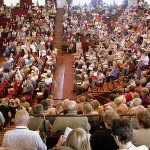Whither the Culture Wars?
A whole lot of people must have been out of the office yesterday because I am quoted in a Foxnews.com article on political clashes between the Catholic Church and the Obama administration. Although I am not sure that it quite captures my remarks to say that “Catholic politicians have been excommunicated in recent years for not supporting positions consistent with the church’s teachings,” I did note what seems to me to be an increased insistence by at least certain Bishops on faithfulness to the Church’s positions on life issues (as opposed to positions generally) and a willingness to enforce that through denial of the Eucharist and cited, for context, New Orleans Archbishop Joseph Francis Rummel’s excommunication of three segregationist politicians in 1962.
Just how aggressive the Church should be in insisting that Catholic politicians follow Church teachings is a topic that has been debated for as long as I can remember (a period that has come to be distressingly long) and I am not sure that I can add anything to on this cold January morning. I am a confirmed opponent of privileged status for public reason and a staunch supporter of political moderation by the church.

